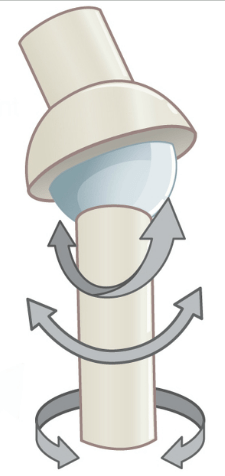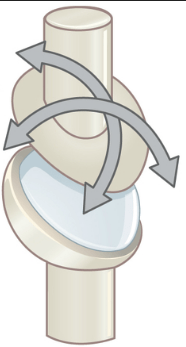This is the name for immovable joints.
What are Synarthroses (Fibrous) Joints?
Fluid-filled sacs that help cushion certain joints are the
A. Menisci
B. Bursae
C. Trochoids
D. Vesicles
Fluid-filled sacs that help cushion certain joints are the
A. Menisci
B. Bursae
C. Trochoids
D. Vesicles
The point of contact between bones is a/an
A. Angle
B. Tuberosity
C. Joint line
D. Articulation
The point of contact between bones is a/an
A. Angle
B. Tuberosity
C. Joint line
D. Articulation
This is a decrease in the angle between bones.
What is Flexion?
This is a movement of the forearm to turn the palm anteriorly.
What is Supination?
This is movement of distal end of a part of the body in a circle
What is Circumduction?
This is the name for a freely movable joint.
What are Diarthroses?
This is the type of joint is pictured below?:background_color(FFFFFF):format(jpeg)/images/article/hinge-joint/qvOooSmobqq9R4tH6E3AIQ_WF92kIRQyj3qzC0MBfHM9Q_Hinge_joint.png)
What is a Hinge Joint?
This is downward movement of a body part.
What is Depression?
This is movement of the soles laterally.
What is Eversion?
This is movement of the forearm to turn the palm posteriorly.
What is Pronation?
This is the movement made when a body part revolves around its own longitudinal axis.
What is Rotation?
This is the name for a tough "skull type" joint.
What are Synarthroses OR Sutures?
Which of the following is stretched or torn in about 70 percent of all serious knee injuries?
A. Articular discs
B. Anterior cruciate ligament
C. Medial meniscus
D. Lateral bursae
Which of the following is stretched or torn in about 70 percent of all serious knee injuries?
A. Articular discs
B. Anterior cruciate ligament
C. Medial meniscus
D. Lateral bursae
This is movement of bone (or body part) toward midline.
What is Adduction?
This is movement of the soles medially
What is Inversion?
This is an increase in the angle between bones.
This is upward movement of a body part.
What is Elevation?
This is the type of joint pictured below.

What is a Ball and Socket Joint?
The inner lining of the synovial cavity is called the
A. Periosteum
B. Fibrous capsule
C. Articular capsule
D. Synovial membrane
The inner lining of the synovial cavity is called the
A. Periosteum
B. Fibrous capsule
C. Articular capsule
D. Synovial membrane
This is the name for movement in which relatively flat bone surfaces move back-and-forth and side-to-side with respect to one another
What is Gliding?
This is the action that occurs when you stand on your heels.
What is Dorsiflexion?
This is movement of a bone (or body part) away from the midline.
What is Abduction?
This is the name the fluid that lubricates and reduces friction in a joint.
What is Synovial Fluid?
This type of joint is slightly moveable, such as the pubic symphysis.
What are Amphiarthrotic (Cartilaginous) Joints?
This is an example of a ball-and socket joint of the lower extremity
A. Knee joint
B. Toe joint
C. Ankle joint
D. Hip joint
This is an example of a ball-and socket joint of the lower extremity
A. Knee joint
B. Toe joint
C. Ankle joint
D. Hip joint
This is movement of a body part anteriorly in the transverse plane.
What is Protraction?
This is the action that occurs when you stand on your toes.
What is Plantar Flexion?
This is movement of an anteriorly projected body part back to the anatomical position.
What is Retraction?
This is the type of joint pictured below.

What is a Condylar Joint?